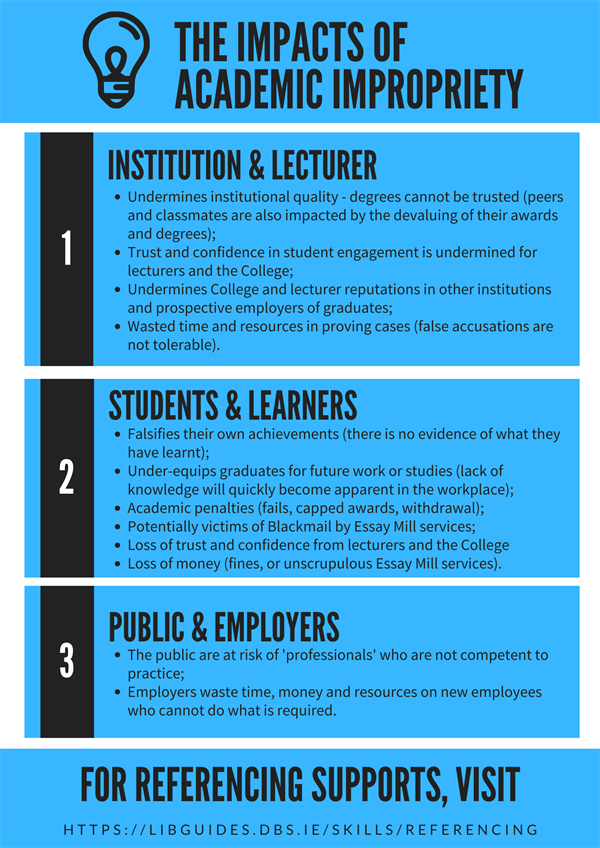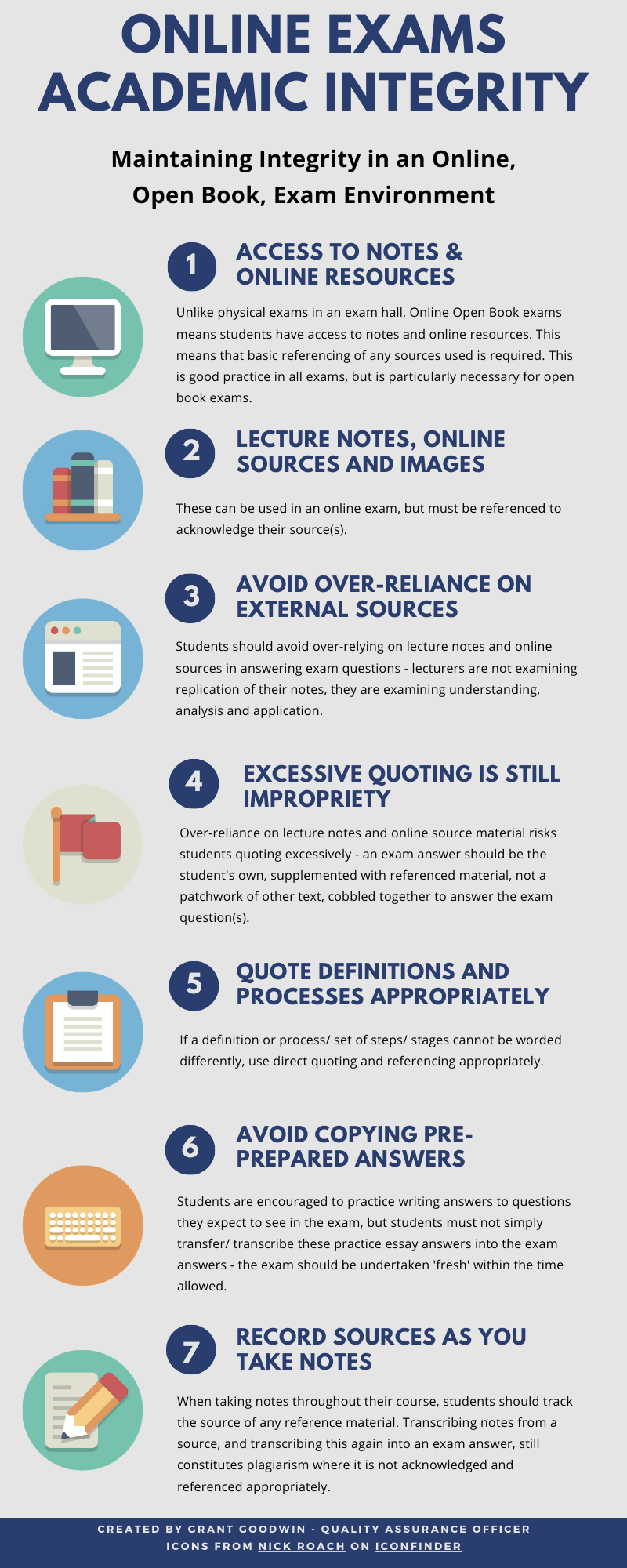Artificial Intelligence Week 2023
In conjunction with Quality & Qualifications Ireland (QQI), the National Academic Integrity Network (NAIN), will celebrate a webinar series, Artificial Intelligence Week 2023 (Mon 27th - Fri 31st March). We encourage learners and staff to engage with these events and activities, as academic integrity is a foundational element of any educational enterprise, and artificial intelligence software is revolutionising the educational sector.
The schedule of events is available on QQI's website, with registration links to the various events.
A DBS activity is the 'What is Academic Integrity and the Borderline of Plagiarism' exercise, which is available HERE, that we invite all learners and staff to explore. Along with this, the Library team has supports regarding academic integrity and best practice, including referencing guides, and faculty can access further information around artificial intelligence software on the College intranet.
See below for further information around academic integrity and additional resources.
Academic Impropriety Committee
The Academic Impropriety Committee convenes as required throughout the academic year. The purpose of the Committee is to assess if Academic Impropriety has occurred in cases put before it (Quality Assurance Handbook, Part B, Section 3.3.8).
Lecturers or invigilators are responsible for compiling the necessary documentation to raise a suspicion to the Committee for their review. A case cannot be investigated without this documentation.
Learners are presumed innocent until a suspicion has been reviewed and academic impropriety has been identified by the Committee. Only the Secretary of the Committee has the authority to input an 'Academic Impropriety' finding on a learner's record, following the determination of the Committee that, on the balance of probability, that academic impropriety has occurred.
The Committee membership comprises members of the academic faculty, library staff, the Quality Assurance Officer, a learner representative, and the Assessments & Regulations Manager (or an appropriate nominee, as Chair).
FAQ Quick-Guide for students invited to a meeting with the Academic Impropriety Committee.
Why is Academic Integrity Important?
Academic Integrity is important for a number of levels. Academic Integrity is more than simply referencing with the right full-stop in the right place, it is responsibly crediting other's work where appropriate, allowing others to verify information and undertake further research themselves, and enabling an examiner to understand the level of understanding a learner has regarding a topic.
Breaches of academic integrity can have significant negative impacts on students and learners, on an institution and its lecturers, and on a national level:

Academic Integrity in Online Exams
Academic Integrity is important to maintain in every assessment, and online exams are no different. The Quality Assurance Handbook, Part B, Section 5.10, sets out the Online Exams Policy, and specifically sets out the principles of Academic Integrity in these assessments. Students should make themselves familiar with these requirements.
Although some Online Exams are taken in an Open Book environment, students must still adhere to the assessment principles to make their exam sitting valid and meaningful.
Proctoring software will be employed on online exams, details will be circulated to students directly.

Ghost Writing/ Essay-Mills
Listen to our podcast, a discussion about Essay Mills/ Ghost Writing, with the Registrar and Assessments & Regulations Manager here:
Watch QQI's short video about
Essay Mills HERE.
Essay Writing Services reach out to learners offering 'assistance' with their assignments. It is important to note that these services are
(1) committing academic impropriety by offering to write assignments for students (therefore breaching DBS assessment regulations), and
(2) breaching Irish law, which bans essay writing services or offering these services.
To accept the help of these services would constitute a breach of our assessment regulations, and where identified, would be escalated to the Academic Impropriety Committee, with recourse to penalties up to and including withdrawal from a learner's programme.
These services try reach learners through LinkedIn (where many learners note they are studying at a particular institute), or other social media platforms, including directly through Whatsapp. This is an additional concern because it would constitute a GDPR breach if a learner's details were made available to an external agent (in this case, this breach is committed by the agency, and the individual who gave them access to another learner's details). These agencies are therefore in breach of two legal regulations, in addition to our assessment regulations. Any individual found to be providing this information would be subject to significant disciplinary and legal penalties.
Why are these services a problem?
1) The marks an assignment receives are to reflect that a learner has achieved the Learning Outcomes of the module - if this is not a learner's work, their grades are falsified, and their final award is fundamentally fraudulently achieved.
2) If it appears that a learner has passed an assignment they have not in fact passed, they may be moved to a stage of their programme which they will not be prepared for, and will subsequently fail out there.
3) If graduates leave the College with falsified awards, they will be hired on the basis of skills they do not have, and any employment may quickly be reviewed and terminated as a result.
4) A graduate with falsified results, failing to complete what their degree says they should be able to do in the workplace, will result in a devalued perception of a DBS award, not only for that graduate, but
all past and future graduates, having a significant impact on other learners and their future employment prospects.
5) These services pretend to offer assistance and support, but they hide disclaimers in tucked away parts of their websites, so they try evade blame if a learner is accused of misconduct, leaving the learner to suffer from institution assessment regulation penalties.
6) These services can and have resorted to
blackmail to extort money out of learners, as they are aware their service breaches education regulations, and any acceptance of their offer can be recorded and used against a learner or graduate, threatening their enrolment, or even their career after they graduate - this is a lifetime risk for any learner who accepts this service.
Where do I find acceptable supports for my academic work?
The College has a number of resources to support learners with their academic work.
The Library hosts a range of
academic referencing classes and guides.
There are
multiple support classes available.
SESU offers
workshops for learners on a number of topics.
If assignments will be late due to Personal Mitigating Circumstances (like poor health, etc), there are the Assignment Extension Requests, or PMC processes available, on the
Ticketing System.
For learner welfare support, Student Services have
further resources available.
What do I do if I am approached by one of these services?
If a service or individual makes contact offering to write your assignments for you, take a screenshot of any contact information that may be included (e.g. a whatsapp profile or email address), and the message(s) they have sent you, and forward these to
academicintegrity @ dbs.ie
The College will escalate these reports to the
national body dedicated to protecting academic integrity and standards in Irish Higher Education.
Once the screenshots/ details are captured, you can block the service/ individual contacting you.
We know most of our learners are undertaking their programmes within the assessment regulations, however we wished to ensure all learners are aware of the strategy these predatory services are using, to avoid being exploited, as well as ensuring the integrity of DBS awards more generally by helping us identify these services and report them to the appropriate bodies.
Academic Integrity Resources
DBS Library referencing guide
DBS Library's Academic Support Classes
Computing/ ICT (coding) Referencing Guide
Quickguide to Plagiarism and how Urkund is intended - a brief guide to plagiarism with some examples and clarification on the role of Urkund in detecting it.
External links
QQI on Academic Integrity (link to external site)
All Aboard Referencing Tutorial (link to external tutorial)
When does Proof-reading become Plagiarism? (link to external article) - "Getting someone else to write an essay is clearly cheating, but what if a student has another person proofread their work?"
WHY We Reference (link to external article) - A brief article on Referencing and Citations, the WHY not the HOW: 'One risk of focusing on how to reference instead of why we ask learners to reference is that learners "are misled about plagiarism because they associate it with correct citations, not with how to handle the ideas being cited."'
Contract Cheating - Substantiating Contract Cheating (link to external resource) - key principles for reviewing assessments for determining whether they were written by external agents.
'Patchwriting' as distinct from Plagiarism (link to external resource) - an article contextualising a subset of plagiarism, called 'patchwriting', within the professional context.
Academic Impropriety - Justice (Case Study) (Case Study - pdf) - An extract from a podcast focusing on Justice, in which the presenter describes an incident where another classmate she tried to help cheated off her work, and accused her of being the cheater.
HECA Seminar Series, supported by the National Forum, on Unintentional Academic Impropriety - a four part seminar series, between Oct 2021 and March 2022, reframing the perspectives around academic impropriety.